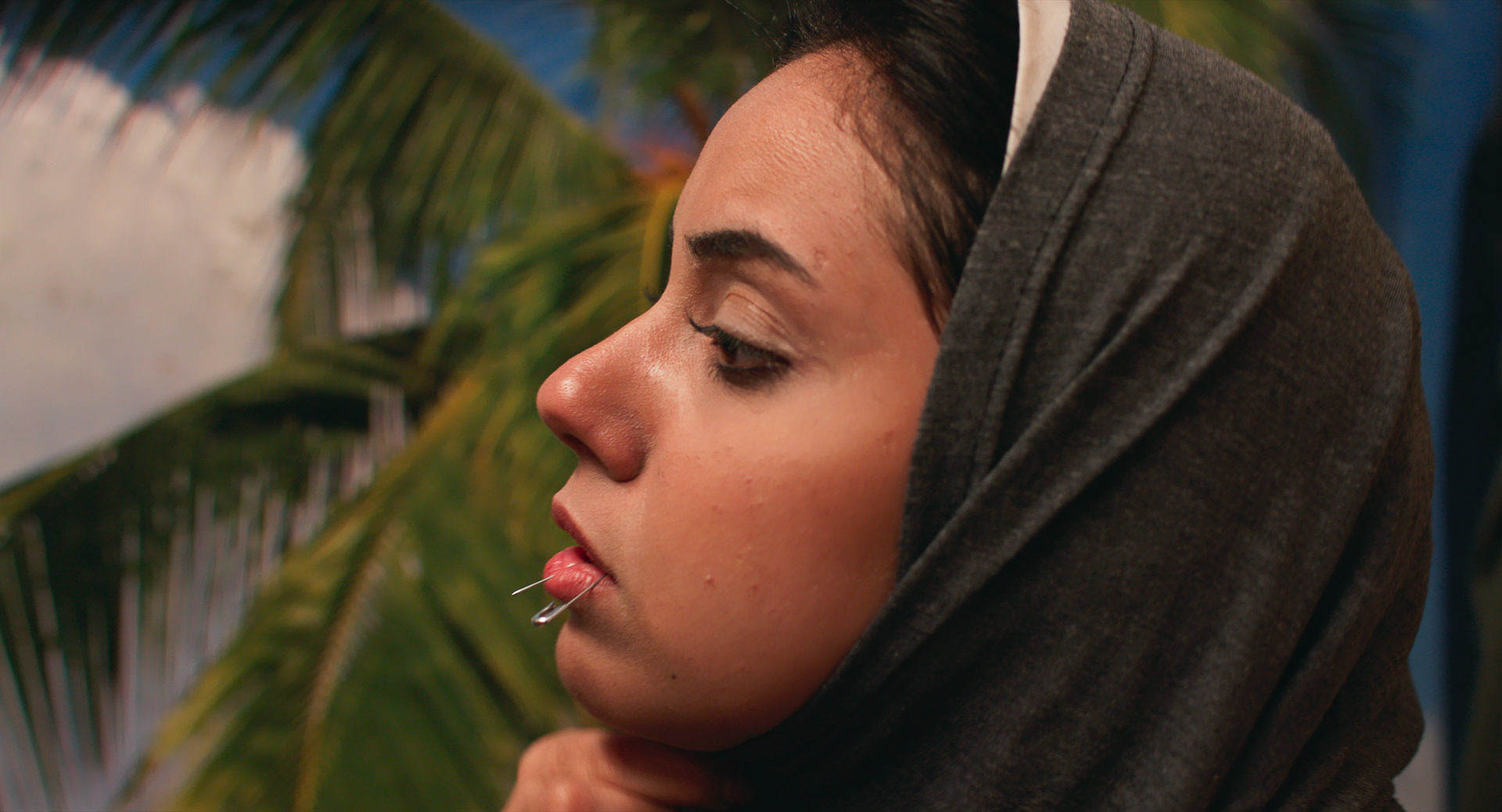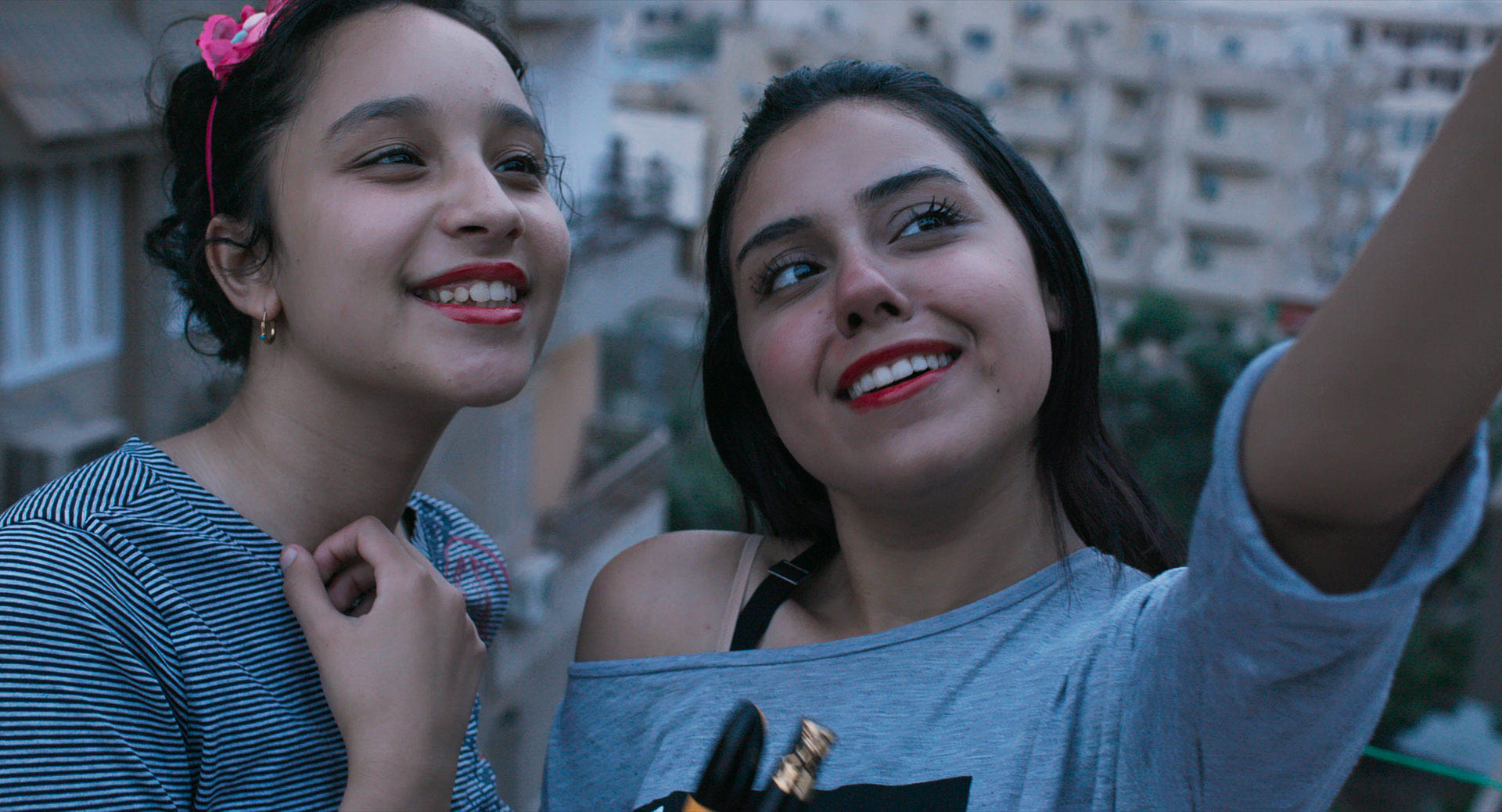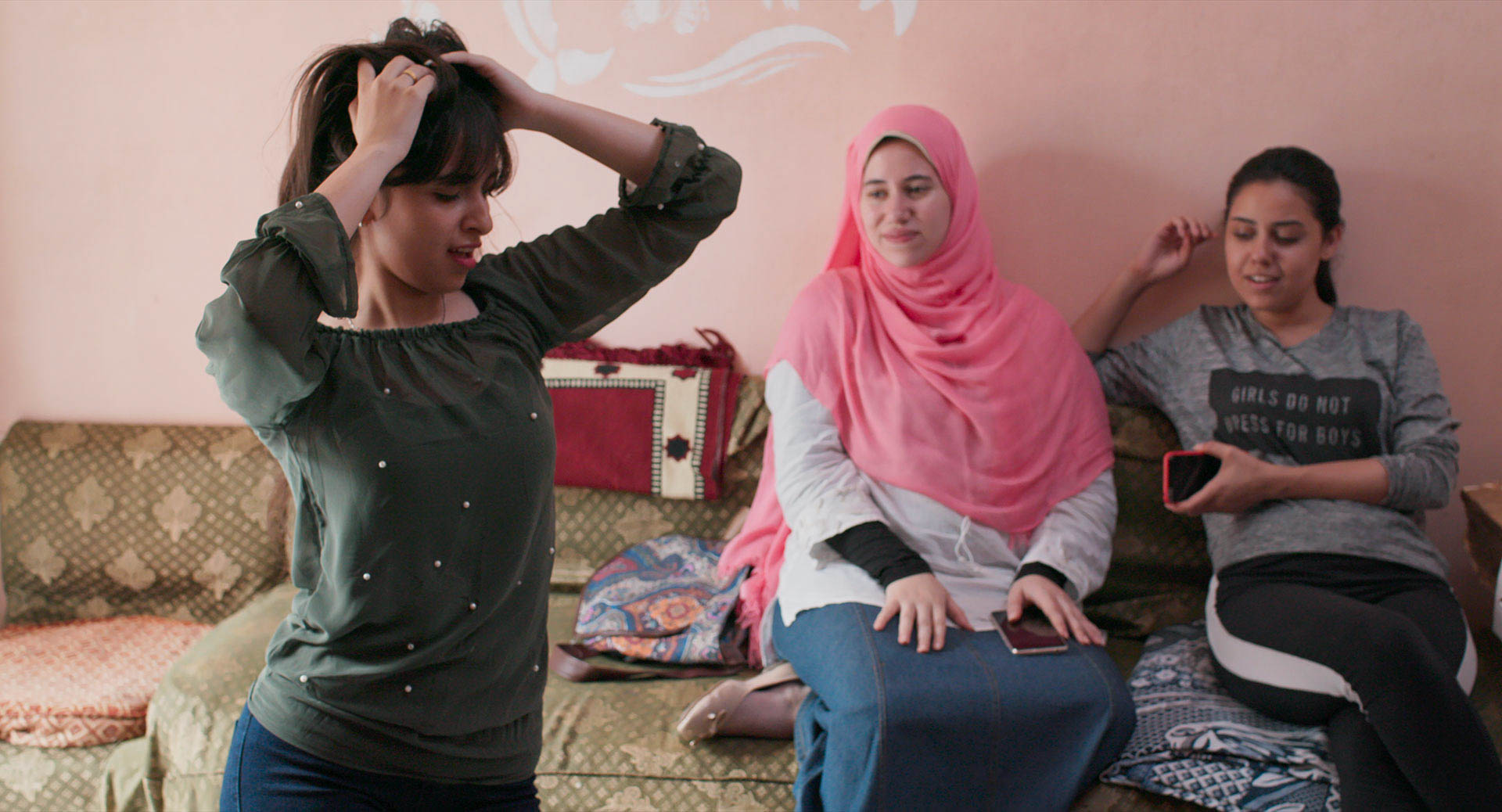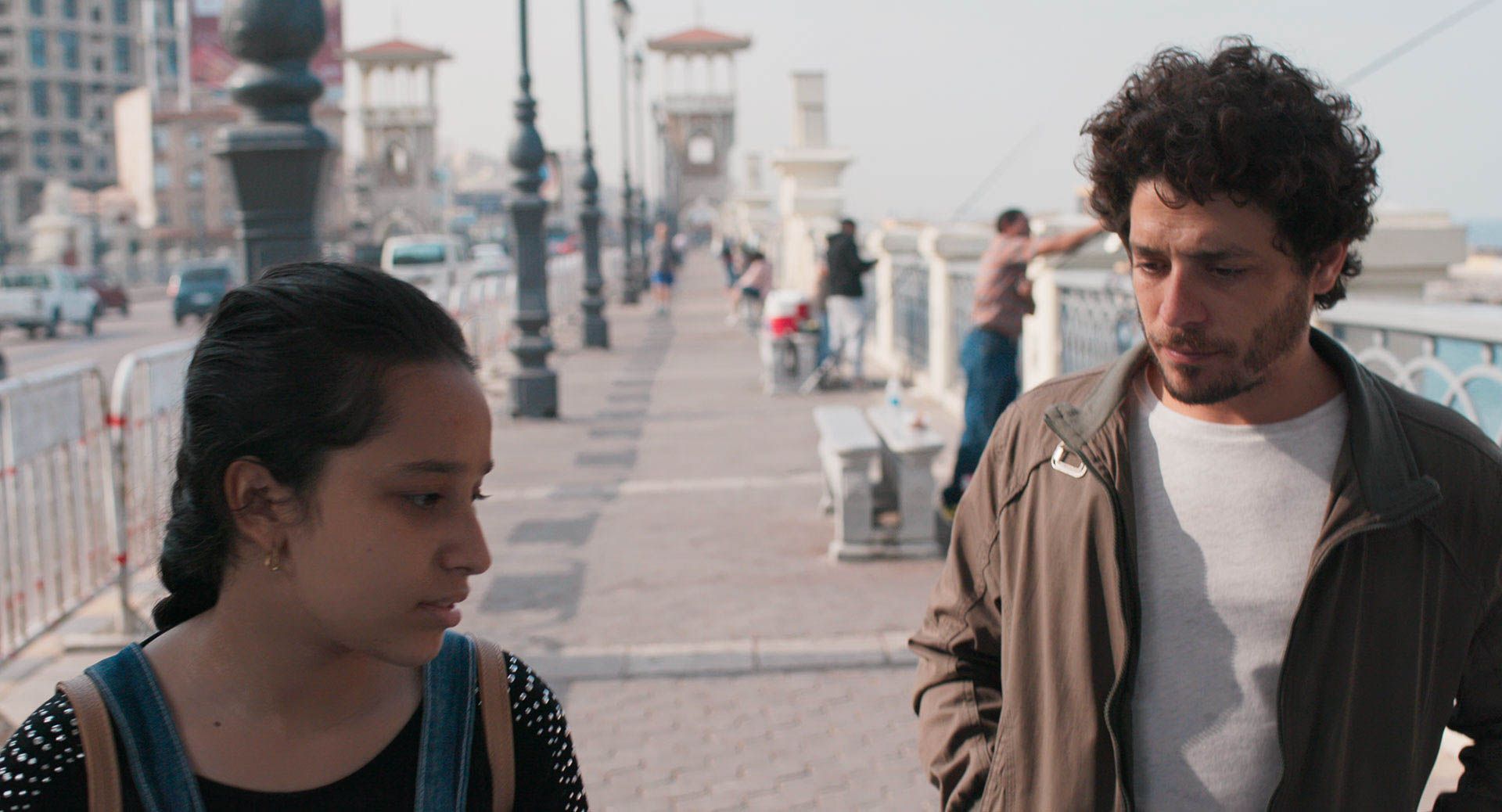Souad – Four Ways

The live-editing workshop is an integral part of each year’s Critics Campus, and this year, four members of the cohort were assigned Ayten Amin’s fiction feature Souad. After penning their reviews, the participants sat through an intensive revision session with The Big Issue film editor and Fireflies founding editor Annabel Brady-Brown. Read their final reviews below.
———
By Tiia Kelly
At one point in Souad, 13-year-old Rabab (Basmala Elghaiesh) makes two wishes: she wants her older sister to go to heaven, and she never wants to fall in love. These hopes are more intertwined than one might think. In Ayten Amin’s tender and naturalistic film, love and desire are mediated through social media, and young women’s sexual longing clashes with the conservative values held closer to home.
We’re introduced to Rabab’s sister, Souad (Bassant Ahmed) on a bus, where she confides details of her life to strangers. Her tales are peppered with conflicting information: to a middle-aged woman sitting beside her, she projects the God-loving persona of a medical student engaged to be married; to a girl her own age, she complains about the way her imagined doctor boyfriend treats her. Through these sensationalised accounts, Souad wields various escapist versions of herself.
Like the passengers on the bus, we’re denied an easy route through which to access Souad. At her family home in the teeming Egyptian city of Zagazig, Souad is far more reserved: she fulfils her domestic duties, worries about her university grades and shrinks into the background during scenes with friends. Through it all, Maged Nader’s handheld cinematography tracks her down hallways and hovers in her face. Her personal space is rarely her own.
Ahmed’s performance is gentle yet impenetrable, brushing off emotions without letting them fully steep. Her character comes alive, though, when formulating her online identity and speaking either to or about her internet boyfriend, a content creator named Ahmed (Hussein Ghanem). Souad ricochets between the intoxication of her digital identity and expectations of purity placed on her. Online, she has agency: to seduce and be seduced. Yet this liveliness is fleeting – only one component of Souad’s reality – and her unknowability is a product of a fragmented existence. Like liquid matter forced to take the shape of the container it’s in, the personas she projects shift with her environment.
It’s only after distressing events remove Souad from the film that it switches to focus on her guarded younger sister, who emerges as the true protagonist. In Souad’s more languid second half, we follow Rabab to Alexandria as she seeks out Ahmed, piercing part of the boundary that separated Souad’s home life from her online one. It’s a transgression that, curiously, illuminates little about Souad. Instead, it sets in motion Rabab’s own self-actualisation as she traces her sister’s imagined movements through the city, trying to infiltrate Souad’s alternate world.
The sisters’ shared desire for relief via the staging of identities crystallises when Rabab impersonates Souad in front of Ahmed – a layered performance that turns from playful to anguished. This is the moment that ties Souad together most potently. Navigating various tenets of contemporary Egyptian life, Rabab doesn’t know exactly who or what she’ll become, but the film’s nuanced, ever-shifting approach to identity gives us a sense of how she might get there.

Souad
By Hassan Abul
In Zagazig, the bus moves slowly; a scooter easily overtakes it. Souad (Bassant Ahmed) hands her phone to the older woman sitting next to her, showing her a photo. “This is my fiancé, Ahmed.” Beaming, she tells the woman about his military service, which is sadly keeping him away, and how her own success at medical school is surpassing people’s expectations. On the same bus but next to another passenger, her demeanour is different; she chews gum with an open mouth, her brows set low and frustrated. This time, Ahmed is her boyfriend, and a surgeon in Cairo; none of the love from the previous conversation remains. Souad has a tendency to fabricate details, revealing the kernel of unhappiness behind her shifting facade.
With Souad, director Ayten Amin follows the title character, 19 and struggling. Her friends range from critical to abrasive; her family is similar. When not riding the bus or performing housework, she’s using social media to be another version of herself: bolder, flirtatious, in some kind of relationship with Ahmed (Hussein Ghanem), who is actually an influencer by trade. Her phone is vitally important, almost always sharing the shot with her, emblematising the theme of dual identities. When Souad’s life reaches a tipping point, the perspective shifts to her younger sister, Rabab (Basmala Elghaiesh), who is determined to understand Souad’s hidden life.
The film does not clutch pearls about the perils of social media. Instead, the tension comes from the stifling atmosphere: colours are desaturated, the non-professional cast’s acting is compact and naturalistic, and most of the film is set in a few small rooms inside the family home. Amin uses frequent close-ups to create a sense of cramped space, rather than a welcome intimacy. Underneath this, the soundtrack grates; there is no score, but traffic noise, neighbours’ arguing voices and general kitchen clatter are constant. The discomforting tone escalates as Souad’s distress, half-hidden from those around her, reaches a boil. When Souad takes tearful selfies in the bathroom one night, the sound drops away into ominous silence.
The sound also reinforces the film’s concern with authenticity, and the gaps between the real and the constructed. When music is deployed, it’s usually played through someone’s tinny phone speakers, replicating the way that characters experience music among friends. The mix then suddenly shifts to a cleaner recording – as though being abstracted, or remembered. This is used to best effect when Rabab passes on a gift from Souad to Ahmed: a recording of Souad singing a love song. After seeing Rabab to the bus stop, Ahmed, his head hung low, walks away, listening to the file. The sounds of the street dissipate, and Souad’s disembodied voice rings out, clear as a bell. She laughs and says, “I won’t send it to you now. I’ll send it to you later, when I feel like it.” Finally, she has shared an honest piece of herself with those who love her, using music to let her walls fall away – even if the choice was not ultimately hers.

Souad
By Vyshnavee Wijekumar
In the opening scene of Ayten Amin’s Egyptian drama Souad, we see the titular university student (Bassant Ahmed) speaking to a middle-aged woman on a bus about her army-officer fiancé Ahmed, whom she adores. In the next moment, Souad speaks to a younger commuter about Ahmed’s inattentiveness. As the scene progresses, these conflicting accounts expose how women moderate themselves in the conservative city of Zagazig.
The experiences of women in modern Egypt are central to Souad. Unlike the glamorised portrayals of women coming of age in such films as Sofia Coppola’s The Virgin Suicides (MIFF 2000) or Deniz Gamze Ergüven’s Mustang (MIFF 2015), Amin’s film feels more observational. The casting of amateur actors adds a raw authenticity to the characters and creates a documentary feel, and the film uses minimal dialogue to depict intimate moments, instead relying on subtext to convey meaning. This is evident when Souad takes bathroom selfies while crying in silence, a comment on the younger generation’s need to document.
The film is partitioned into three perspectives: dutiful Souad, her sister Rabab (Basmala Elghaiesh) and Souad’s perceived boyfriend, Ahmed (Hussein Ghanem), a budding influencer. Souad’s fate is largely out of her control. She navigates two realities: the domestic servitude and singular prospect of marriage that governs her day-to-day life, and the freedom afforded by social media. Souad’s subdued persona when carrying out chores with her parents is juxtaposed against more candid moments with Rabab, Ahmed and her peers, liberal-minded Wessam (Hager Mahmoud) and the more traditional Amira (Sarah Shedid). As a result, the plot is slow and jarring, and the storyline meanders.
The duality of Souad’s life is stifling. Though outspoken among her friends, she still upholds pretence within female friendships. The film shines during honest interactions, including a quiet scene between Souad and Wessam as they gossip on a balcony. The tightly framed handheld camera captures the details of their facial expressions. They openly discuss kissing as Wessam smokes, captivating the audience with this naively clandestine conversation. In contrast, when Souad is questioned about her attraction to Amira’s brother, she retorts, “He’s like a brother to me.” The constant performative virtue feels exhausting without reprieve, limiting agency in adulthood.
As in most conservative cultures, freedom in Egypt is gendered, but Souad’s smartphone enables sexual liberation. For the first 50 minutes of the film, Ahmed largely remains a faceless voice that Souad converses with through Facebook. She endures all the frustrations and excitement of a long-distance relationship, from ghosting to phone sex. In the middle of the night, against the noise of bustling traffic, Souad sternly tells Ahmed, “You kept asking for my photos, and when you got them, you started your bullshit,” indicating that her affections are unrequited.
Ultimately, Souad questions the role of social media. A conduit for freedom of expression, it also breeds inauthentic relationships and highly curated public personas. To avenge her sister, Rabab bravely meets Ahmed alone in the cosmopolitan city of Alexandria, confronting him using Facebook messages on Souad’s phone: “You said, I love you too.” Digital platforms often compensate for the loneliness in our real lives and, in the case of Souad, this can be a dangerous thing.
Souad is a powerful exploration of womanhood, where no-one escapes unscathed.

Souad
By Ying-Di Yin
Ayten Amin’s Souad opens with the protagonist (Bassant Ahmed) sitting on a bus, telling a passenger how excited she is to be reunited with her fiancé. A quick seat change and Souad is now a disgruntled girlfriend complaining about her partner’s sister. Like trying on various outfits with her friends, Souad is testing out different personas, attempting to find an acceptable fit. For this young woman in Zagazig, a small, conservative city north of Cairo, it is a daily challenge to find her true self – and that’s before you throw social media, family and religious constraints into the mix.
In her second feature, the Egyptian director follows the lives of two sisters – 19-year-old Souad and 13-year-old Rabab (Basmala Elghaiesh) – unveiling a multi-dimensional image of young, modern Egyptian women that is rarely seen on screen. Souad is obsessed with social media and is involved in a turbulent online romance with the older Ahmed (Hussein Ghanem), a content creator living in Alexandria. Halfway through, the film pivots to naive Rabab as she travels to metropolitan Alexandria to meet Ahmed and learn more about her sister’s double life.
Souad is also playing roles inside the confines of her family home, but we catch glimpses of her true self. When she’s not attending to her distant father, mother or domestic chores, Souad is cheeky and lively with her friends as she talks about boys and future plans, and swaps beauty tips. We also witness the angst she feels towards Ahmed, repeatedly sending voice messages threatening to stop speaking to him when he doesn’t respond to her texts. Souad believes she must present opposing images of herself – a devoted, conservative daughter offline, and a sexy and sassy woman online – and the pressure mounts.
Amid these carefree moments, the mobile phone is a strong presence, supposedly signifying freedom and self-expression but ultimately presenting another set of rules to abide by. One afternoon, Rabab and Souad sneak up to the balcony to put on make-up and snap suggestive selfies together. The camera focuses on the reality in which the image is created, before glancing over their shoulders to show what has been curated on screen – all in real time.
Aside from several outings accompanied by her mother or sister, Souad’s life happens within four walls. The sense of confinement is strengthened by the absence of a film score. Instead, we hear noisy, ambient street sounds from the outside world, evoking a sense of danger and amplifying Souad’s dependence on social media for human connection.
Amin began her career as a documentary filmmaker, and she adopts this style in Souad. The film invites us into a privileged space: the intimate lives of these Egyptian teenagers, which unfolds, quite literally, behind closed doors. She adds to these moments of sisterhood by casting non-professional actors and letting them improvise in several scenes.
Souad is a drama that moves through the highs and lows of being an adolescent without control. It does not provide solutions. Due to the stop-start filming process (at times paused for months between shoots), Amin was able to constantly rewrite scenes and even alter the original ending. Perhaps that’s the hope she wishes to offer to young Egyptian women: the choice to navigate their lives freely and openly, and more importantly, to be able to decide the outcome.